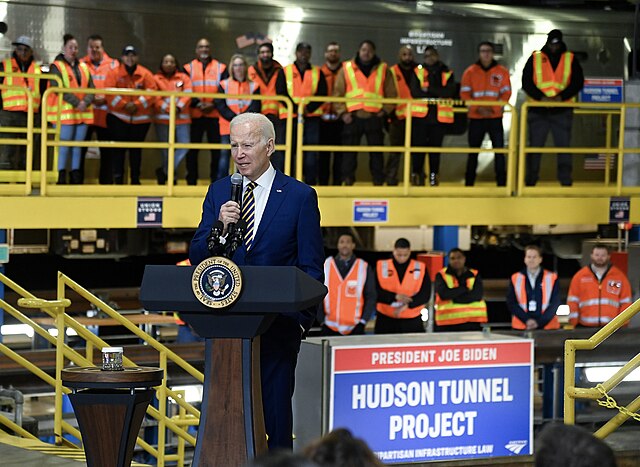Bidenomics

My colleague in Economics Nina Eichacker has a piece in Dissent about the complexities of Biden’s economic plans and all the different constituencies it has helped, wondering as well why it doesn’t get the positive attention it should.
Whatever you think about Joe Biden, the achievements of Bidenomics deserve celebration. The Biden administration bucked economic orthodoxy by boosting household income, which successfully lowered the child poverty rate, including for nonwhite households. And it initiated supply policies to address shortages in the global economy while promoting workers’ rights. The three major industrial policies that form the centerpiece of Bidenomics embedded social protections, labor interests, and environmental justice into American economic policy. In the process, the Biden administration has begun to rebuild coalitions with groups that were abandoned by past Democratic administrations.
When Biden came into office in 2021, the world was still in the middle of a global pandemic with enormous economic repercussions. In response, Democrats implemented an unprecedentedly large fiscal stimulus package, which included additional weekly payments of $600 and later $300 to those receiving unemployment insurance. In defiance of Democratic economic advisors like Larry Summers and Jason Furman, who argued that this spending risked increasing inflation, the Biden administration passed still more fiscal stimulus, as well as enhancing the Child Tax Credit to directly support low-income households. This material support reduced child poverty.
The Biden administration also entered the White House determined to reverse Trump’s attacks on the environment and labor. The Trump administration weakened hundreds of pollution regulations, including emissions standards reporting requirements and waste dumping regulations for coal mines. It appointed anti-union members to the National Labor Relations Board, which subsequently rolled back numerous Obama-era protections for workers, including the right to organize at franchises and requirements that legal settlements in favor of workers provide “full remedy” for violations.
….
The persistent lack of recognition for the achievements of Bidenomics is a political puzzle. Polling at the time of writing shows general discontent with unemployment, inflation rates, and high housing prices; as of May 2024, a majority of Americans believed the U.S. economy was in a recession, though nominal GDP has steadily increased since the first quarter of 2021, and real GDP has increased since the second quarter of 2022. Despite persistent inflation between 2021 and 2023, real wages have grown across the income spectrum, with the greatest gains for the lowest income levels: 13.2 percent for the lowest decile, compared to 4.4 percent for the top decile. Some of the discontent may be fallout from the Federal Reserve’s inflation targeting policies, which have raised interest rates, hindered home building, and calcified housing’s consistent contribution to overall inflation. Congress also limited the potential appeal of Bidenomics. Conservative Democrats like Joe Manchin blew up the enhanced Child Tax Credit and the Build Back Better Act, which had included hundreds of billions of dollars more for industrial spending, large expansions of social services, and mandated sick and care leave for families.
You know, Joe Manchin really does deserve all the hate he gets.


